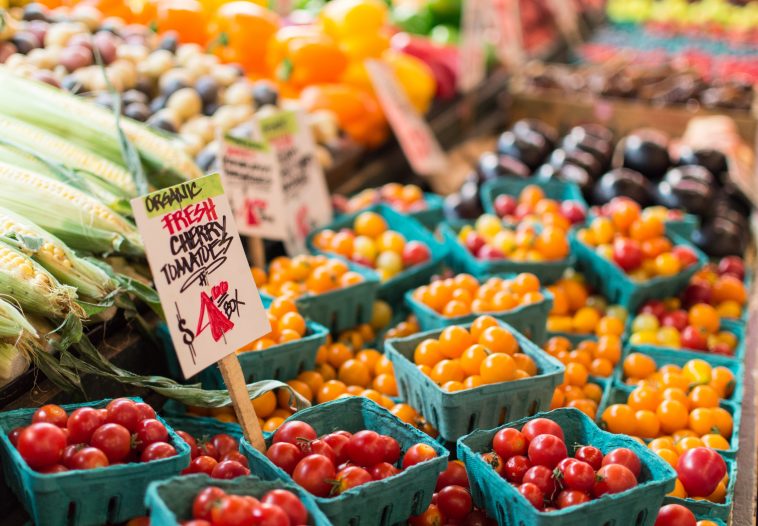Learning the ropes of organic food shopping can seem overwhelming at first — particularly to your wallet. However, for budget-minded individuals and families, there are ways on how to shop organic and healthy without breaking your budget.
Shop Fresh, Save Cash
When it comes to eating a more organic, yet affordable diet picking seasonal fruits and vegetables is one way to stretch your dollar. Plus, in-season produce often tastes the best. To keep your grocery shopping list on track with all the right organic fruits and vegetables, plan out your meals ahead of time.
And keep in mind, you don’t have to plan more than a couple of days in advance. By now, you’ve likely heard about people who can meal prep and plan for weeks at a time. While this certainly works, planning too far in advance might lead to more impulsive and, thus, costly purchases when you shop organic.
Considering how quickly our cravings can change, the dinner you had planned for Saturday might be the last thing you want to eat when the day arrives. So what do you end up doing? You likely rush to the store to pick up more ingredients, which can then tempt you into buying more than you need, or you end up ordering takeout. Plus, too extreme planning can leave out spur of the moment opportunities, such as when your partner picks up a pizza on the way home. If you don’t plan correctly, those skipped planned meals end up going to waste.
Try Not to Waste
While a few skipped meals throughout the week probably doesn’t seem that wasteful, it adds up. In fact, according to the U.S. Department of Agriculture, around 30% of the food we buy ends up in landfills. Not only does this impact the environment, wasting valuable resources such as water and energy, but it’s money down the drain.
When you shop organic, it’s essential to learn how to limit yourself to buying only what you’ll use. It can be hard to plan exactly how many apples you’ll eat in the day, but getting as close as you can to the right amount is still helpful to your budget and the environment.
Moreover, for those times when you do end up with leftover food, keep it out of the landfill by utilizing some unconventional methods to reduce food waste. This can look like using old stale bread to make delicious bread pudding or mealing-sharing with neighbors or your children’s teachers.
Inspire a Positive Relationship with Food
Another way to shop organic and healthy without breaking your budget is to shop around. While this can be time-consuming and a bit of a hassle, these days, it is much easier to peruse various sales and competitive prices than in the past. All it takes is jumping online to look at a few grocery store websites and see what offers they have. If you prefer to shop locally, many small businesses will at least have a social media page where they announce exclusive sales or allow you to contact someone to discuss prices.
Shopping around for more affordable options can also inspire a better sense of intentionality when it comes to your food habits. This, in turn, is likely to help you develop a more positive relationship with food, making the process of procuring healthy, affordable food for yourself and your family more enjoyable. When you look forward to cooking a delicious, healthy meal each day, shopping around becomes part of the journey rather than just another chore. Furthermore, when you cook at home more than eating takeout, it gives you full control over the ingredients, portion size, and overall cost.
Pick Your Battles
Committing to a total overhaul of your lifestyle and eating habits all at once can lead to an early defeat. Switching to shop organic, healthy eating is a significant change to both your usual diet and budget, so to ensure the longevity of this worthwhile change, start slowly. An easy way to do this is to stick with the Clean 15.
The Clean 15 list includes certain conventional produce, such as avocados, pineapple, onions, eggplant, and asparagus, that have low amounts of pesticide residue. This makes them not much worse than their organically produced counterparts.
On the other hand, there is also the Dirty Dozen. If you’re going to make any produce a priority on your organic shopping list, it should include items from the Dirty Dozen. This includes produce such as strawberries, spinach, apples, celery, and potatoes as these are notably some of the worst items for pesticide use.
Eventually, once your budget adjusts to the new costs of shopping organically, you can then switch to shop organic foods exclusively. In the meantime, though, you can still save money with these helpful guidelines, without sacrificing your health.
Whatever your reasons are for wanting to switch to a healthier, more organic diet, there are numerous ways to enjoy this lifestyle without going broke. With enough motivation and helpful tricks up your sleeve, you can enjoy all the many benefits of how to shop organic while maintaining your budget.
Read more:



